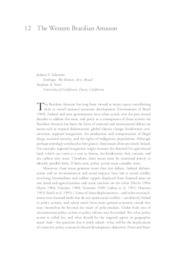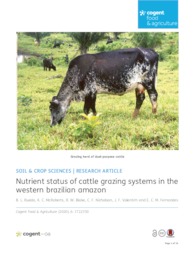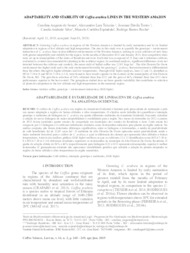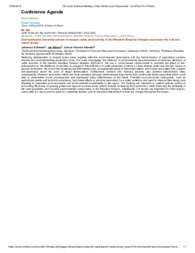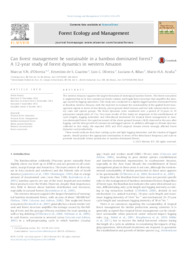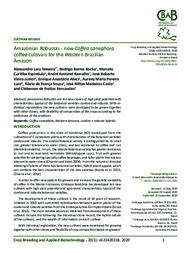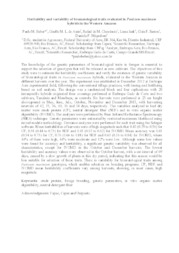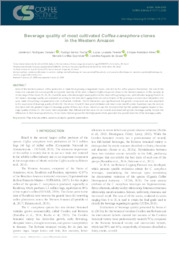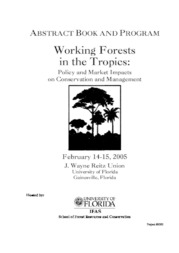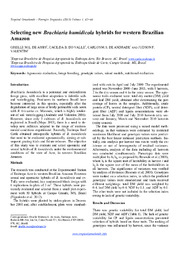Search Publications
Filter by:
| Author(s): VALENTIM, J. F.; VOSTI, S. A. These challenges are set alongside new opportunities provided by new and better-performing markets; new technology; some marked shifts in the political climate at the local, state, and international l... ... |
| Author(s): RUEDA, B. L.; McROBERTS, K. C.; BLAKE, R. W.; NICHOLSON, C. F.; VALENTIM, J. F.; FERNANDES, E. C. M. Low-input cultivated pastures to feed cattle have dominated land use after forest clearing for decades in the western Brazilian Amazon. This study was undertaken to help understand the inherent nutrie... ... |
| Author(s): SOUZA, C. A. de; TEIXEIRA, A. L.; TORRES, J. D.; SILVA, C. A.; ESPINDULA, M. C.; ROCHA, R. B. Growing Coffea arabica in regions of the Western Amazon is limited by early maturation and by its limited adaptation to regions of low altitude and high temperature. The aim in this study was to quant... ... |
| Author(s): SCHIELEIN, J.; BÖRNER, J.; VALENTIM, J. F. Reducing deforestation in tropical forest areas requires effective environmental governance and the transformation of agricultural systemstowards less land-demanding production forms. Our study invest... ... |
| Author(s): OLIVEIRA, M. V. N. d'.; GUARINO, E. de S. G.; OLIVEIRA, L. C. de; RIBAS, L. A.; ACUNÃ, M. A. The western Amazon supports the largest formation of neotropical bamboo forests. This forest ecosystem is neglected due to its low commercial timber volume and fragile forest structure that amplifies... ... |
| Author(s): TEIXEIRA, A. L.; ROCHA, R. B.; ESPINDULA, M. C.; RAMALHO, A. R.; VIEIRA JUNIOR, J. R.; ALVES, E. A.; LUNZ, A. M. P.; SOUZA, F. de F.; COSTA, J. N. M.; FERNANDES, C. de F. Amazonian Robustas are ten new clones of high yield potential with characteristics typical of the botanical varieties conilon and robusta. With individual registration, the new cultivars were develope... ... |
| Author(s): BEBER, P. M.; ASSIS, G. M. L. de; CLEMENCIO, R. de M.; JANK, L. The knowledge of the genetic parameters of bromatological traits in forages is essential to support the selection of genotypes that will be released as new cultivars. The objectives of this study were... ... |
| Author(s): DALAZEN, J. R.; ROCHA, R. B.; PEREIRA, L. L.; ALVES, E. A.; ESPINDULA, M. C.; SOUZA, C. A. de Most of the Western Amazon coffee production is made from growing unregistered clones, selected by the coffee growers themselves. The aim of this study is to evaluate the sensory profile and genetic d... ... |
| Author(s): KAINER, K. A.; WADT, L. H. de O.; GOMES-SILVA, D. A. P.; CAPANU, M. Brazil nut (Bertholletia excelsa H.B.K.) is a long-lived emergent, distributed throughout much of the Amazon?s terra firme forests, and lianas that climb this forest dominant are in a superior positio... ... |
| Author(s): ASSIS, G. M. L. de; VALLE, C. B. do; ANDRADE, C. M. S. de; VALENTIM, J. F. Brachiaria humidicola is a perennial and stoloniferous forage grass, with excellent adaptation to infertile soils and waterlogging. Producers in northern Brazil have become interested in this species,... ... |
Observation
Some of Embrapa's publications are published as ePub files. To read them, use or download one of the following free software options to your computer or mobile device. Android: Google Play Books; IOS: iBooks; Windows and Linux: Calibre.
Access other publications
Access the Agricultural Research Database (BDPA) to consult Embrapa's full library collection and records.
Visit Embrapa Bookstore to purchase books and other publications sold by Embrapa.

